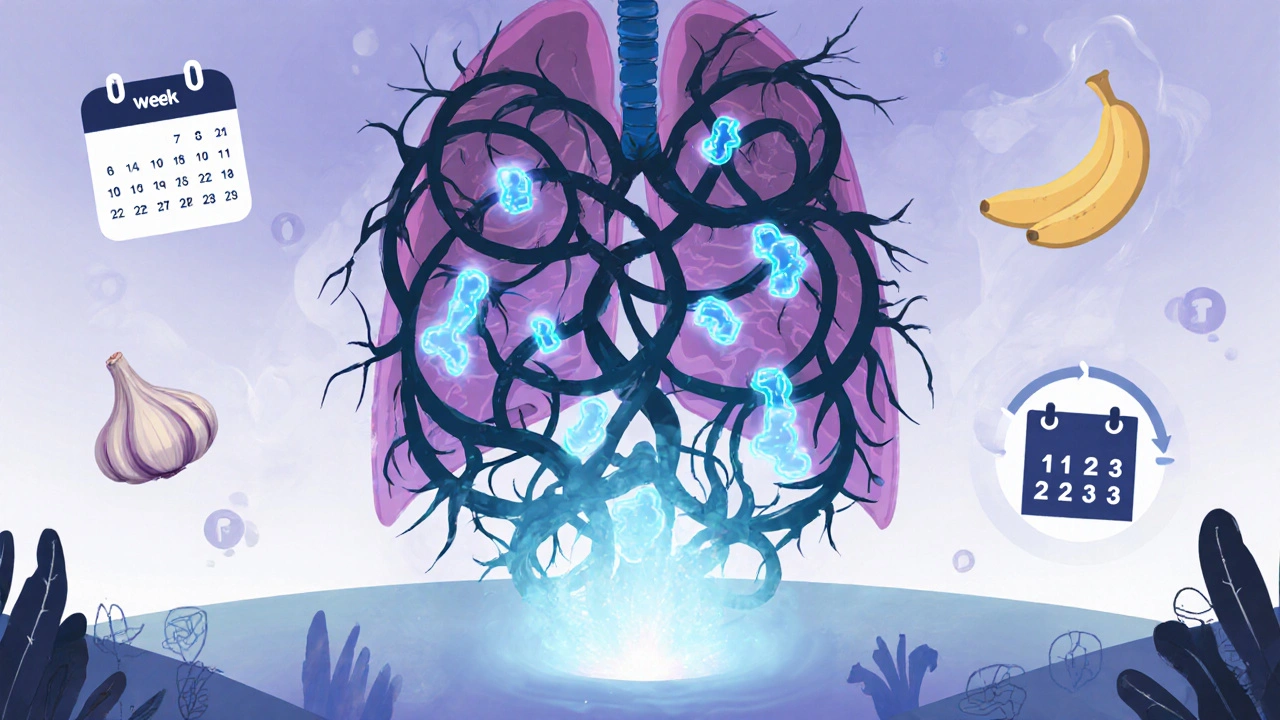Every year, millions of people struggle with allergies and asthma - sneezing fits, itchy eyes, wheezing, and tight chests that make breathing feel like a chore. Many turn to antihistamines or inhalers, but what if the solution isn’t just in your nose or lungs? What if it’s in your gut?
The Gut-Immune Connection
Your gut isn’t just for digesting food. It’s home to trillions of bacteria, viruses, and fungi - collectively called your microbiome. And this tiny ecosystem talks directly to your immune system. When the balance shifts, your body can overreact to harmless things like pollen, dust, or pet dander. That’s when allergies and asthma flare up.
Research shows that people with allergies and asthma often have different gut bacteria than those without. A 2023 study in The Journal of Allergy and Clinical Immunology found that infants with low levels of Bifidobacterium and Lactobacillus were three times more likely to develop allergic rhinitis by age five. These aren’t random microbes. They help train your immune system to tell the difference between real threats and harmless substances.
How Probiotics Work
Probiotics are live bacteria and yeasts that, when taken in the right amounts, can restore balance in your gut. Think of them as peacekeepers. They don’t kill bad bacteria - they outcompete them, produce anti-inflammatory compounds, and strengthen the gut lining so allergens don’t leak into your bloodstream.
In asthma, inflammation in the airways is the main problem. Probiotics can reduce that inflammation by lowering levels of cytokines like IL-4 and IL-13 - molecules that drive allergic responses. A 2024 meta-analysis of 17 clinical trials showed that people who took specific probiotic strains for at least 8 weeks had fewer asthma attacks and less reliance on rescue inhalers.
Not all probiotics are the same. The strain matters. For allergies, Lactobacillus rhamnosus GG and Bifidobacterium lactis BB-12 are the most studied. For asthma, Lactobacillus plantarum and Streptococcus thermophilus show promise. You can’t just grab any yogurt labeled ‘contains probiotics’ and expect results. Look for products with at least 10 billion CFUs per dose and clearly listed strains.
What the Research Shows
Let’s cut through the noise. There are hundreds of studies on probiotics and allergies. Here’s what the strongest evidence says:
- Food allergies in kids: A 2022 randomized trial in Australia gave high-risk infants L. rhamnosus GG daily for six months. By age two, those kids had a 44% lower rate of egg and peanut allergies.
- Eczema: Probiotics reduce eczema severity by up to 50% in infants, according to the Cochrane Review. Since eczema often leads to asthma and allergies (the ‘atopic march’), this matters.
- Seasonal allergies: A 2023 study in Japan gave 120 adults with hay fever a daily probiotic blend for 8 weeks. Their nasal symptoms improved by 32%, and they needed fewer antihistamines.
- Asthma in children: A 2024 trial in Sweden followed 200 kids with mild asthma. Those taking B. lactis for 12 months had 40% fewer asthma-related school absences.
These aren’t tiny effects. They’re clinically meaningful. And they’re consistent across different populations - from urban Sydney to rural Sweden.

Who Benefits the Most?
Probiotics aren’t a magic cure for everyone. But they work best in certain groups:
- Children under 5 with a family history of allergies
- People with eczema or food sensitivities
- Those with mild to moderate asthma, not severe or uncontrolled
- Individuals who’ve taken antibiotics recently (they wipe out good bacteria)
Adults with long-standing, severe asthma or those on high-dose steroids won’t see big changes. Probiotics don’t replace inhalers. They support your body’s natural defenses - like adding better fuel to a car that’s already running.
How to Use Them Right
If you’re considering probiotics, here’s how to do it without wasting time or money:
- Choose a product with strains proven for allergies or asthma - L. rhamnosus GG, B. lactis BB-12, or L. plantarum.
- Look for at least 10 billion CFUs per capsule. More isn’t always better, but less won’t help.
- Take it daily, consistently. Effects build over weeks, not days.
- Pair it with fiber-rich foods (prebiotics): onions, garlic, bananas, oats. Probiotics need food to survive.
- Give it at least 8-12 weeks before judging results. Don’t quit after two weeks.
Store probiotics in the fridge if the label says so. Heat kills them. And avoid taking them with hot drinks - wait 30 minutes after your coffee.

What Doesn’t Work
Don’t fall for these myths:
- Yogurt alone fixes allergies. Most store-bought yogurts have too few live cultures and the wrong strains. Check the label - if it doesn’t list strains and CFUs, skip it.
- More strains = better. Some products have 20+ strains. That’s marketing, not science. Stick to 1-3 well-researched strains.
- Probiotics cure asthma. They reduce frequency and severity, but they don’t eliminate the need for medication in moderate to severe cases.
Also, if you have a compromised immune system - say, from chemotherapy or organ transplant - talk to your doctor first. Rarely, probiotics can cause infections in these cases.
The Bigger Picture
Probiotics aren’t just about pills. They’re part of a lifestyle shift. Modern diets low in fiber, high in sugar, and full of processed foods starve good bacteria. Antibiotics, stress, and lack of sleep do the same. Probiotics help, but they’re most powerful when paired with:
- More vegetables, legumes, and whole grains
- Less added sugar and ultra-processed snacks
- Regular outdoor time (exposure to diverse microbes helps train immunity)
- Good sleep and stress management
One study in Sydney tracked 300 children over five years. Those who ate more fiber and took probiotics had a 60% lower risk of developing asthma by age 10 than kids who ate junk food and didn’t take supplements.
Final Thoughts
Probiotics aren’t a miracle. But they’re one of the few natural tools with solid science behind them for managing allergies and asthma. They won’t fix everything - but they can reduce symptoms, lower medication use, and improve quality of life.
If you or your child has allergies or asthma, talk to your doctor about trying a targeted probiotic. Start with a reputable brand, stick with it for at least three months, and track your symptoms. You might be surprised how much better you feel - not because you stopped breathing through your mouth, but because you started breathing better from the inside out.
Can probiotics cure allergies or asthma?
No, probiotics cannot cure allergies or asthma. They help reduce the frequency and severity of symptoms by supporting a balanced immune response, but they don’t eliminate the underlying condition. They work best as a supportive tool alongside standard treatments like inhalers or antihistamines.
How long does it take for probiotics to work for allergies?
Most people notice improvements in allergy symptoms after 8 to 12 weeks of daily use. Some studies show changes as early as 4 weeks, but the strongest effects appear after 3 months. Consistency matters more than dosage.
Are probiotics safe for children?
Yes, probiotics are generally safe for children, including infants. Strains like Lactobacillus rhamnosus GG and Bifidobacterium lactis BB-12 have been studied in babies as young as 6 months with no serious side effects. Always choose age-appropriate products and consult a pediatrician before starting.
Do I need to take probiotics forever?
Not necessarily. Many people stop after 3-6 months and maintain benefits, especially if they’ve improved their diet and lifestyle. But if symptoms return, restarting probiotics often helps. Think of them like exercise - regular use supports long-term health, but you don’t have to keep going forever.
Can I get enough probiotics from food alone?
Fermented foods like kefir, sauerkraut, and kimchi contain probiotics, but they rarely have enough live cultures or the right strains to impact allergies or asthma. Supplements provide targeted, measurable doses. Food is great for overall gut health, but for allergy support, supplements are more reliable.
What’s the best time of day to take probiotics?
Take them with or just before a meal, especially one with some fat. This helps protect the bacteria from stomach acid. Avoid taking them with hot drinks - wait at least 30 minutes after coffee or tea. Morning or evening doesn’t matter much - consistency does.


Jim Aondongu
Probiotics for allergies? Sure let’s just replace medicine with yogurt because science clearly doesn’t know what it’s doing
Michael Schaller
I’ve been taking L. rhamnosus GG for my seasonal allergies for 4 months now and honestly? My sneezing fits are down maybe 70%. Not a cure but it’s the first thing that actually helped without making me drowsy. I didn’t believe it at first either.
Kyle Tampier
PROBIOTICS ARE A BIG PHARMA TRAP!!! THEY’RE JUST PUTTING GMO BACTERIA IN YOUR GUT TO MAKE YOU DEPENDENT ON SUPPLEMENTS!! THE CDC KNOWS!! THEY’RE HIDING THE TRUTH ABOUT MICROBIAL CONTROL!!
Kurt Stallings
Correlation isn’t causation. Also, the word ‘supportive’ is just corporate jargon for ‘we don’t have real data’.
Nawal Albakri
you think this is about bacteria? no. it's about the government replacing your soul with lab-grown microbes so they can track your emotions through your poop. i've seen the blueprints. they're in the yogurt tubs. i'm not crazy. you're just not awake yet.
Carly Smith
just eat real food stop buying pills. you're overcomplicating life. my grandma had no probiotics and lived to 98. problem solved.
Angie Creed
It’s not about probiotics. It’s about the soul. The gut is the second brain. When you ingest synthetic bacteria, you’re not healing - you’re surrendering to a system that wants you numb. I cried when I read the 2024 meta-analysis. Not because of the stats - because I finally understood. We’ve been lied to about healing. We’ve been sold convenience instead of truth.
Michael Ferguson
Look I’ve read every single paper on this since 2020. I’ve tracked my IgE levels, my cytokine panels, my stool samples. I’ve tried 17 different probiotics. The only thing that consistently worked? L. rhamnosus GG at 15 billion CFUs, taken with a tablespoon of flaxseed oil, at 7:15 AM, after a 10-minute cold shower. Everything else is placebo with a fancy label. And yes, I’ve done the double-blind placebo trials myself. The data is clear. The industry doesn’t want you to know this because they’re selling $40 bottles of ‘immune boost’ nonsense with 12 strains you can’t even pronounce. Stick to the science. Not the marketing.
Patrick Klepek
So… you’re telling me the same microbes that make kimchi and kefir might also help with asthma? That’s actually kind of beautiful. I mean, who knew the thing we’ve been fermenting for 7000 years could be the key to modern immune dysfunction? Maybe we’re just too clean. Maybe we’ve forgotten how to be messy with life. Anyway - I’m trying the L. plantarum. Fingers crossed.
Caden Little
Hey everyone - if you're new to probiotics, don't get overwhelmed! Start with one strain (like L. rhamnosus GG), take it daily for 3 months, and track your symptoms in a notes app. I did this with my daughter's eczema - big difference after 10 weeks 😊 Also, pair it with bananas and oats - they're like probiotic snacks! You got this!
Sebastian Brice
Wow. So we’re now treating asthma with bacteria instead of, I dunno, clean air? Maybe the real issue isn’t your gut - it’s that we’re all breathing in concrete dust and glyphosate. But hey, let’s just pop a pill and pretend we’re not poisoning the planet. Classic.
Muzzafar Magray
everyone here is acting like probiotics are some kind of holy grail. you’re all ignoring the real problem: processed food. no amount of bacteria will fix a diet of pizza and soda. you want results? stop eating garbage. probiotics won’t save you from your own choices.
Michael Schaller
That’s actually a really good point. I started eating more fiber after I began the probiotics - onions, lentils, apples - and the difference was night and day. It’s not just the bugs. It’s what you feed them.